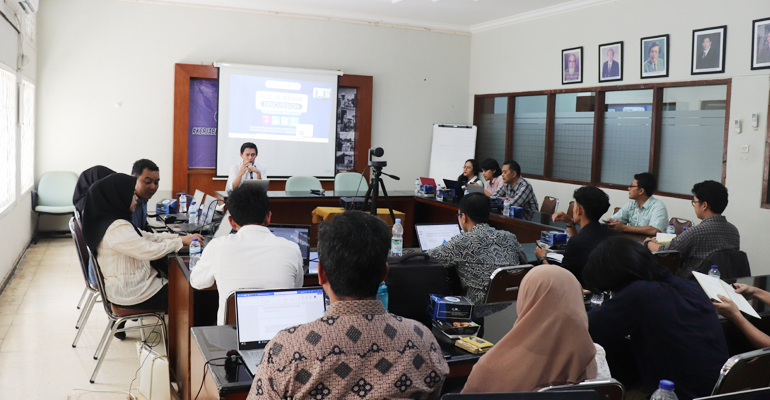DKSRA IPB University Organises FGD Discussing the Urgency of Energy Transition

The Directorate of Strategic Studies and Academic Reputation held FGD series 4 with the theme Urgency of Equitable Energy Transition for the Prevention of Natural Resources Damage: A Sustainable Funding Perspective. This activity was hosted by Thomas Oni Veriasa from the Indonesian Tropical Nature Institute (LATIN).
The FGD event was held in a hybrid manner at the Zoom Meeting and Session Room of the Centre for Agricultural and Rural Development Studies, IPB Baranangsiang Building. This activity was attended by 48 participants who attended in a hybrid manner offline and online through Zoom Meeting.
In general, this FGD aims to discuss implementative steps related to energy transition in Indonesia accompanied by sustainable financing support so that it can have a valuable impact on the local community and the environment.
Prof Ernan Rustiadi, Vice Rector of IPB University for Research, Innovation, and Agromaritime Development, conveyed the importance of ensuring a sustainable energy transition not only environmentally but also socially and economically.
“We have agreed on the importance of clean energy. That is the world’s big narrative and we are heading there to leave fossil and conventional energy. Towards new and renewable energies,” said Prof Ernan Rustiadi.
He continued, if we look deeper, some of our efforts are effective but some are ineffective and turn out to lead to injustice and reduced community access to certain resources. Therefore, he said, we want to ensure that this energy transition must move towards the principles of sustainability.
“Sustainability is not only environmental but also social and economic. It is hoped that what is conveyed by the speakers today can be accommodated and formulated for the workshop in a series of IPB University Anniversary events,” said Prof Ernan Rustiadi.
This activity invited the Bioenergy Trend Asia Programme Manager, Amalya Reza Oktaviani; Forest Watch Indonesia Campaign and Policy Intervention Manager, Anggi Putra Prayoga; and the Research Manager of the Centre for Energy and Mining Law Studies (PUSHEP), Akmaluddin Rachim, S.H., M.H as discussion starters.
In her presentation, Amalya Reza said that often what we go through in the context of energy transition turns out to be a false solution. “Indonesia implements a co-firing policy by mixing coal and biomass in PLTU. This method is considered carbon neutral, even though if examined further, biomass, which is predicted to be a new renewable energy solution, actually leaves dirty traces,” she said.
The same thing was said by Anggi Putra Prayoga, from Forest Watch Indonesia. In his presentation, he said that the implementation of biomass-based energy transition has a detrimental impact on deforestation. He also said that there are basically four strategies to accelerate new renewable energy, namely, primary energy substitution, conservation of fossil primary energy, additional capacity of new renewable energy (EBT), and utilisation of non-electric EBT.
“It is necessary to transform the Timber Forest Product Utilisation Business Permit (IUPHHK) in natural forests and IUPHHK in industrial plantation forests, as well as the issuance of forest utilisation business permits (PBPH) in production forests,” he said.
He also mentioned that it is also necessary for state-owned enterprises to apply for PBPH through OSS and cooperation with community cooperatives.
In addition, Akmaluddin Rachim conveyed the other side of the energy transition from the direction of the energy transition financing policy. He said that the Constitution of the Republic of Indonesia guarantees Indonesian citizens to live in prosperity.
He mentioned that the opening of the 1945 Constitution of the Republic of Indonesia in the 4th paragraph stated, “Then than that to form a government of the Indonesian state that protects the entire Indonesian nation and the entire Indonesian blood sphere and to advance the general welfare, educate the nation’s life and participate in carrying out world order based on independence, eternal peace and social justice.”
Akmal also said that the energy transition policy and its financing are regulated in various legal products. In addition, there are five investment focus areas that have been identified to accelerate the energy transition. These are the development of transmission networks, early retirement of coal-fired power plants, acceleration of baseload renewable energy, acceleration of variable renewable energy, and development of renewable energy supply chains.
The activity then continued with a discussion conducted by Dr Joko Tri Haryanto as President Director of the Environmental Fund Management Agency; Dr. Bahruni, IPB University lecturer from the Department of Forest Management; and Arif Aliadi as Chairman of the Community Forest Ecosystem Services Management Board. The hope is that with this event IPB University can formulate the right policy regarding energy transition towards clean energy that applies the principles of sustainability and justice. (AEA) (IAAS/RUM)



